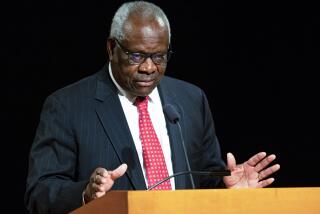BANKING
- Share via
What’s in a Name: In case anyone could forget Charles H. Keating Jr. and the arrogance, greed and political influence peddling he has come to symbolize, Washington politicians and public relations people have immortalized his name.
Now, when a senator or a representative wants to do a favor for a constituent, the lawmaker first goes through the “de-Keatingizing” process.
De-Keatingization, according to the latest issue of the Columbia Journalism Review, is “a combination of vaccination and crop dusting that allows a public official to do what he wants to do (such as voting his conscience on an issue) without appearing to be contaminated by impure motives (such as money).”
Keating, convicted last year of state securities fraud and now serving a 10-year prison term, contributed generously to politicians in state and national elections. But on Capitol Hill he will be remembered best for gathering more than $1.3 million for five U.S. senators and asking them to help him get federal thrift regulators to end a long financial examination of his Lincoln Savings & Loan in Irvine.
The five lawmakers, including Alan Cranston (D-Calif.), were reprimanded by the Senate Ethics Committee for their contacts with regulators, starting with two meetings in 1987. The Irvine S&L; collapsed two years later and became the nation’s biggest thrift failure, costing taxpayers $2.6 billion.
In a Columbia Journalism Review story, Frank Mankiewicz, one of the premier spin doctors in the Washington public relations industry, said a congressman agreed to support business legislation favored by Mankiewicz clients if Mankiewicz could first de-Keatingize him.
“I didn’t know what he meant,” Mankiewicz told the trade magazine, “but he explained he didn’t want his constituents, especially the press, saying he was supporting it just because he’d gotten contributions from one of the parties involved.”
More to Read
Inside the business of entertainment
The Wide Shot brings you news, analysis and insights on everything from streaming wars to production — and what it all means for the future.
You may occasionally receive promotional content from the Los Angeles Times.









